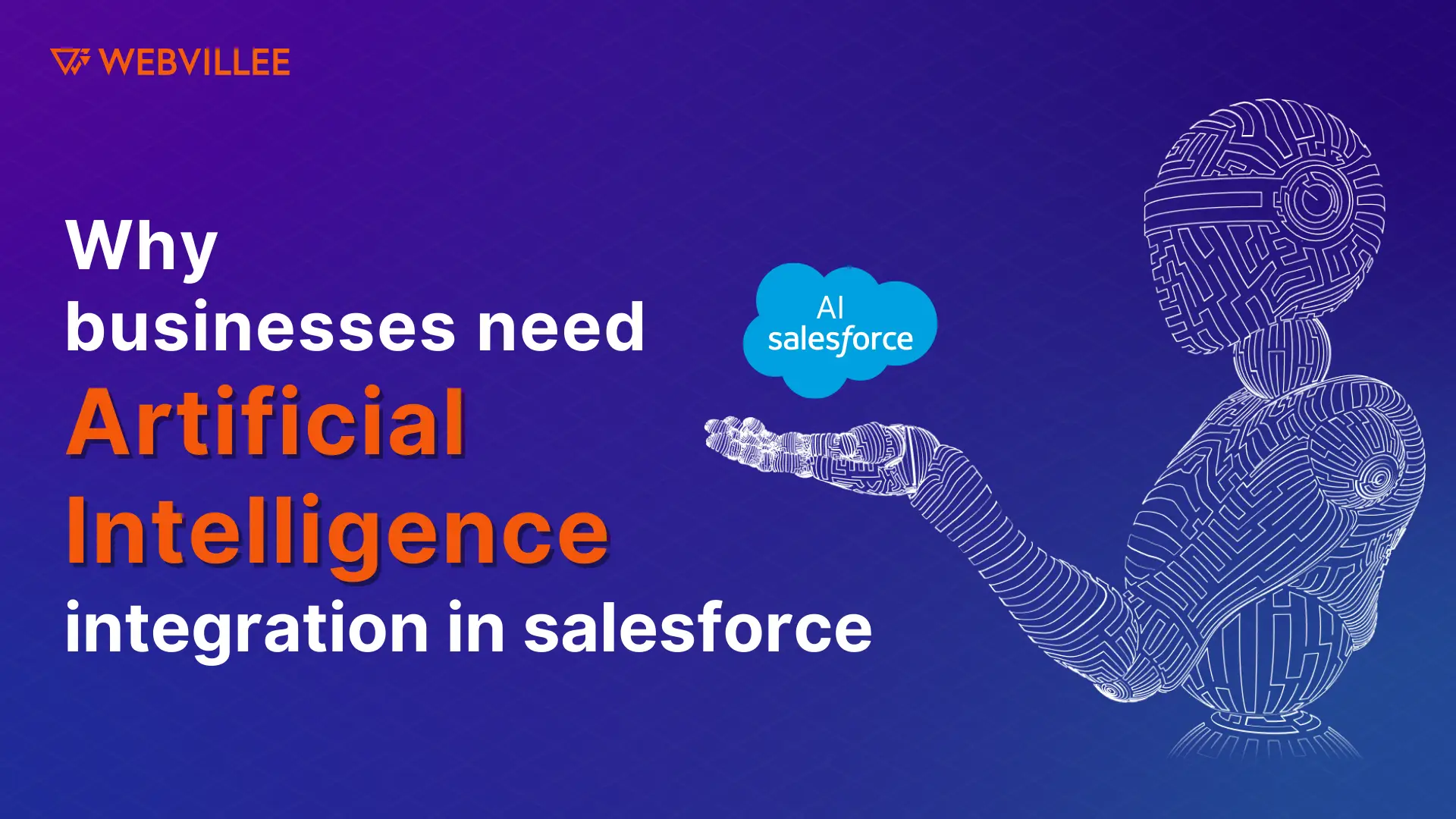One of the most impactful advancements in reshaping business processes is artificial intelligence (AI), especially when integrated into customer relationship management (CRM) systems like Salesforce. With its robust capabilities, Salesforce has already established itself as a leader in the CRM market, and the infusion of AI takes it to unprecedented heights.
This blog delves into why businesses need AI integration in Salesforce and how it transforms operations, customer relationships, and overall growth.
1. Supercharging Sales with Predictive Analytics
AI integration in Salesforce enhances sales processes by providing predictive analytics that helps businesses forecast trends and identify opportunities. AI tools like Einstein in Salesforce analyze historical data to predict customer behaviors, including likelihood to buy, upsell opportunities, and churn risks.
- Lead Scoring: AI automatically scores leads based on their likelihood to convert, helping sales teams focus on high-value prospects.
- Deal Insights: Sales reps can get real-time recommendations on closing deals faster by analyzing patterns in past successful deals.
These capabilities reduce guesswork and empower sales teams to make informed decisions, driving revenue growth.
2. Personalized Customer Experiences
Customer expectations are at an all-time high. They demand personalized interactions and solutions tailored to their specific needs. AI integration in Salesforce enables businesses to meet these demands by:
- 360-Degree Customer View: AI consolidates customer data from various touchpoints, providing a comprehensive view of each customer.
- Dynamic Personalization: Marketing Cloud in Salesforce uses AI to tailor content, recommendations, and promotions based on customer preferences, behaviors, and purchase history.
According to a McKinsey report, businesses that excel in personalization see 5-15% increases in revenue. AI in Salesforce ensures every interaction feels personal, increasing customer loyalty and satisfaction.
3. Automation of Mundane Tasks
One of the most significant benefits of AI is its ability to automate repetitive and time-consuming tasks. AI in Salesforce automates processes like:
- Data Entry and Cleaning: AI ensures CRM data remains accurate and up-to-date by identifying duplicates and correcting errors.
- Workflow Automation: Tasks such as email follow-ups, scheduling meetings, and assigning leads can be automated, allowing teams to focus on strategic activities.
By automating routine operations, businesses save time, reduce errors, and increase productivity.
4. Enhanced Customer Support with AI-Powered Chatbots
AI-driven chatbots like Einstein Bots in Salesforce provide round-the-clock support, significantly improving customer service. These bots:
- Handle common queries efficiently, reducing wait times.
- Escalate complex issues to human agents with detailed context.
- Offer multilingual support, making businesses accessible to global customers.
Gartner predicts that by 2025, 80% of customer interactions will be managed by AI, reducing operational costs while improving service quality.
5. Actionable Insights with Advanced Analytics
AI integration in Salesforce brings sophisticated analytics capabilities that transform raw data into actionable insights. For instance:
- Sentiment Analysis: AI analyzes customer interactions to gauge satisfaction and address issues proactively.
- Opportunity Forecasting: Sales teams can predict which opportunities are likely to close and allocate resources accordingly.
These insights enable businesses to identify trends, optimize strategies, and stay ahead of the competition.
6. Optimizing Marketing Campaigns
Marketing teams can harness the power of AI in Salesforce to create and execute highly effective campaigns. AI analyzes customer data to identify the best time, channel, and content to engage users.
- Audience Segmentation: AI helps marketers segment their audience based on behavior, preferences, and demographics.
- A/B Testing Optimization: AI speeds up A/B testing by predicting which campaign variations will perform best.
This level of precision increases the return on investment (ROI) for marketing efforts.
7. Improved Data Security and Compliance
Data security is a critical concern for businesses, especially when handling sensitive customer information. AI in Salesforce enhances security by:
- Identifying Anomalies: AI detects unusual patterns in system access or data usage, flagging potential security threats.
- Ensuring Compliance: AI helps businesses stay compliant with regulations like GDPR by monitoring and managing data usage effectively.
This proactive approach to security builds customer trust and minimizes risks.
8. Scalability for Growing Businesses
As businesses scale, managing customer relationships and operations becomes more complex. AI in Salesforce ensures scalability by:
- Predictive Scaling: AI forecasts resource requirements based on business growth, ensuring systems remain efficient.
- Dynamic Adaptability: AI adapts to new business processes and customer behaviors, making it a valuable tool for evolving needs.
This scalability allows businesses to expand without overburdening their teams or resources.
9. Competitive Advantage
Incorporating AI into Salesforce not only enhances internal processes but also provides a significant edge over competitors. Businesses that adopt AI-driven CRM strategies are better positioned to:
- Respond faster to market changes.
- Deliver superior customer experiences.
- Optimize resources effectively.
As AI becomes a standard in CRM, early adopters of Salesforce AI integrations will reap long-term benefits.
10. Real-Life Success Stories
Many businesses have already experienced the transformative power of AI integration in Salesforce. For instance:
- Coca-Cola: The company uses Salesforce’s AI capabilities to predict product demand and optimize inventory management.
- Amazon: Amazon integrates AI with Salesforce to deliver hyper-personalized recommendations to customers.
These examples highlight how businesses across industries can leverage AI in Salesforce to achieve remarkable results.
Conclusion: Why Now is the Time for AI in Salesforce
AI integration in Salesforce is no longer a futuristic concept—it’s a present-day necessity. From enhancing sales processes and customer support to driving personalization and automating tasks, AI empowers businesses to operate efficiently, delight customers, and grow sustainably.
As AI continues to evolve, its applications in Salesforce will expand, offering even more sophisticated tools for businesses. Organizations that invest in this integration now will be better equipped to navigate the challenges of tomorrow, ensuring they remain competitive in an ever-changing market.

